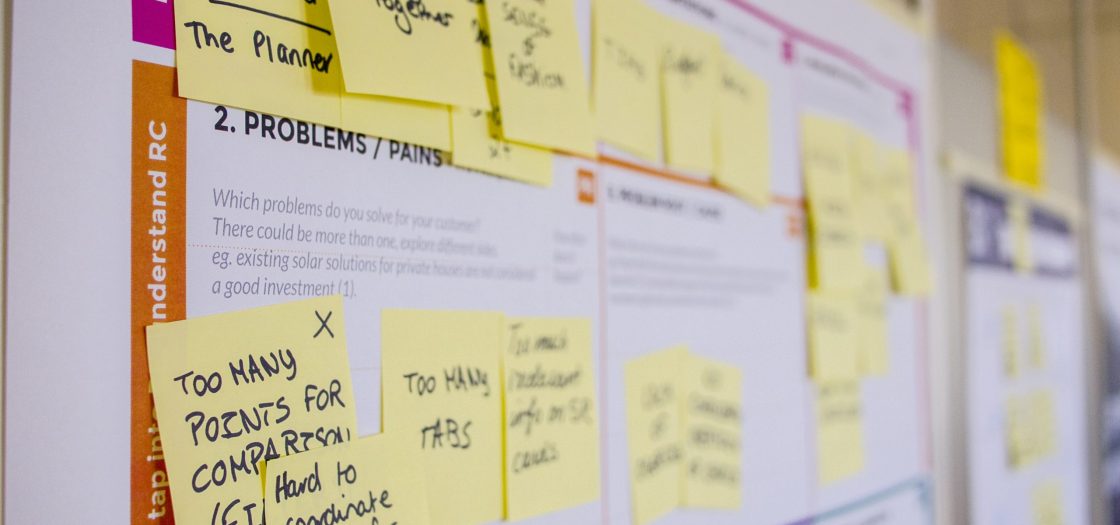
Wait a second! How can problem-solving be better than finding a solution? It’s not logical! The ultimate goal of every entrepreneur is to provide solutions, but I’d argue that problem-solving should always come first. Let me show you why.
Many entrepreneurs start with the solution and end up with a product or service that no one wants.
Why?
Because it doesn’t solve a problem, and there’s no point in having a solution to something that isn’t a real problem. This is why problem-solving and problem-framing skills are so necessary nowadays.
Let’s dive a bit deeper.
Creating a business is an act of problem-solving
No matter what your business does, it helps your clients fill in some need or overcome an obstacle. From selling popsicles on the beach on a hot day to supplying rocket fuel to Elon Musk, it’s all about fulfilling a need or what we refer to as problem-solving.
To put it simply, business starts with a problem, a need, a demand, and then comes a solution. It can be more traditional and secure or more innovative and risky. But either way, that solution fits the specific problem like a missing piece of a jigsaw puzzle.
What happens if you do it in the opposite order? You could be supplying Musk’s rockets with popsicles.
You might be solving the wrong problem
It’s not a secret that a lot of entrepreneurs form a personal attachment to their ideas, and they naturally want them to succeed. While the intention here is good, it constantly takes you away from the problem you were trying to solve in the first place.
In many cases, instead of problem-solving, they focus on pushing their solution to fit the problem. Of course, the chances that it will work are not zero, but still pretty low.
Accepting that your views may be incorrect implies falling in love with the problem. It shows that no matter how much work you’ve put into a solution, it won’t be valuable until actual end-users test it.
Most importantly, it implies that ideas are not valuable but the problems they solve are.
Here’s why leading with a solution is a bad idea.
You don’t find the right audience
Your problem-solving adventure always starts with the key element – your customers. Having a robust digital strategy that helps you identify your actual audience allows you to concentrate on creating products and solutions for the right audience.
Plus, it makes it easy to develop a marketing strategy that positions you as a business that understands your audience and their needs, rather than just creating products for the sake of it.
Finding the right audience helps you fully understand their pain points, which will help when it comes to problem-solving. And keep in mind that you are not your audience.
Your solution isn’t specific
It’s all too simple to leap right into solving an issue when one emerges.
However, if you don’t look into what caused the problem in the first place, you end up with something that doesn’t genuinely solve the problem. You’ll likely end up treating the symptoms instead of the cause. And that’s unsustainable.
If you’re dealing with a big problem, you’ll want to look at it from various perspectives. When you get a 360-degree view of the problem, you’ll get a better understanding of how you can approach it with your resources and capabilities.
You waste time and money
Building a business takes a great deal of time and cash flow. And, if you start with the solution, you might end up pouring all that time and money in the wrong direction. What a waste of your talent and resources.
Sure, you could get a few returns back, but they’re not likely to last. Or be enough to recover the resources that you put in initially. What helps in this situation is getting feedback from your audience and pivoting once you see that it’s not working out as you expected.
You limit your options
Almost any problem has more solutions than the first one that comes to mind. As a result, it’s best to create a list of alternative solutions that you and your team can evaluate and decide which is ideal for the specific problem. And test, test, test.
Some experiments that were carried out to measure the value of creative ideas showed that the best ideas came once the participants ran out of the initial pool of ideas and had to push through the started solutions. They literally had to start thinking outside the box to come up with something good.
Problem = opportunity
There’s one thing that problem-solving teaches us – problems are there for a reason; they’re opportunities in disguise.
Entrepreneurs don’t have much of a choice when dealing with issues, whether they come from competitors, the economy, or client demands.
They can, however, choose whether to view those difficulties as problems or opportunities.
Try adopting a growth mindset that sees problems as opportunities. As well as to openly admit existing company challenges, develop a method of reviewing and addressing problems, avoid perfectionism, and tap into the collective wisdom around you.
Make a beeline for complex problems.
Because when you solve them, you’ll have less competition and more opportunities than if you tried to improve an existing process incrementally.
How to be a more “problem-oriented” business owner
For entrepreneurs, problem-solving abilities are a constant source of frustration.
Problems can snowball, and tension can stifle production. But it’s possible to turn negative habits into positive habits and dramatically improve your problem-solving abilities.
Here are a few ways to develop a more problem-oriented approach in your business.
Beginners mindset
If you’re a long-time business owner, this is one of the hardest things to do. But, when you’re able to look at old problems from a beginner’s point of view, you’ll come up with fresh, new answers.
A beginner’s mindset entails approaching a situation as if it were your first time, regardless of your previous experience. It requires you to consider all problems without prior judgment and with a completely open mind.
Intuition and data
Even though many startup media sensationalizes data, intuition still plays a big part in decision making. Your gut feeling comes from your experience and knowledge.
The truth is, you need the right combination of both data and intuition. You need data to identify patterns, problem areas, and growth rates. But it would help if you also had your intuition to guide how to interpret that data.
Talk to people
Problem-solving doesn’t happen in a vacuum. To get a better understanding of what you could work with you need to get out, experience, feel, live through things, get opinions, and learn about others.
People around you are an inexhaustible source of ideas and information. Of course, it might feel easier to work with something that you’ve experienced first-hand, but that again is limiting your options. Besides, helping others might be one of the most rewarding parts of being an entrepreneur.
Keep your eyes and ears open at all times
Keep your eyes and ears open for new opportunities. It’s possible that the problem you think you’re experiencing isn’t the same as what others are experiencing.
There’s a good chance the problem is caused by something other than what you’re thinking. It’s also possible that the greatest solution won’t solve your problem and instead leads your company in a different direction.
Question everything
It’s more than okay to question things, but not in a mean way.
How many times have you jumped to a solution without first asking questions and listening, only to realize afterward that you might have come up with a far better answer if you had first asked questions and listened?
Smart questions help to clarify difficulties and provide a clear picture of the challenges at hand.
It becomes much easier to explore various scenarios and identify the optimum solution that leads to growth and profit when this happens.
Don’t do it alone
Sharing the load is a fantastic technique to get rid of fear-based reasoning! Of course, you should work on your problem-solving skills independently, but there’s no need to try to fix everything alone.
Creating a team-building effort and playing off each other’s talents can be more efficient than doing something alone and letting your project suffer.
People in an organization will speak up if they have the freedom to share their issues, thoughts, and ideas. And their input will assist you in moving more quickly and efficiently.
Problem-solving is a process
The ability to adapt is crucial to practical problem-solving in business.
You can waste a lot of money and time if you continue on the wrong track for too long. Make a plan to lower your risk right now by adopting a problem-solving approach in everything you do. Whether it’s in the products and services that you offer, your marketing messaging, or your internal processes. Always focus first on understanding the problem.





